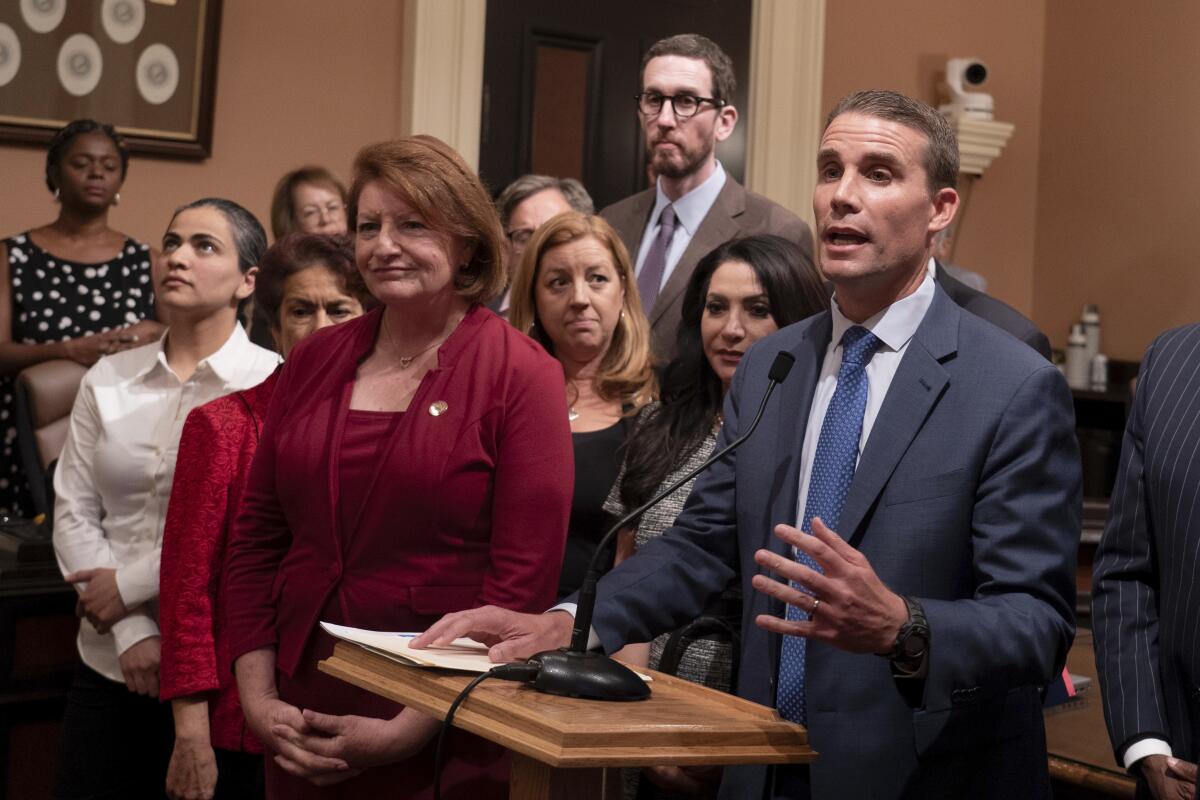California Politics: Another changing of the guard in Sacramento

- Share via
SACRAMENTO — Energy in Sacramento is cranking up this week as lawmakers head into the final sprint of action before the legislative session ends Sept. 14. We’ve got lots of news to share.
First, this dispatch from my colleague Taryn Luna, who sat down with Senate leader Toni Atkins on Monday night shortly after she made a big announcement:
In a room at the state Capitol adorned with images of Senate leaders of the past, Atkins stood at a lectern earlier this week and announced that her time at the helm of the upper house will soon become history, too.
The 61-year-old pro tem commended her Democratic caucus for coming to a quick decision and praised her successor and ally, Sen. Mike McGuire.
A long drawn-out campaign at the end of session would not have been in the best interest of the Senate or the people they represent, Atkins said.
“I think the concern is, if this takes too long, if it’s protracted, if there’s contention that rises to the level that keeps us from doing this work, it could impact the work we do,” Atkins said in an interview in her office after the announcement.
The tone she set could not have been more different than the rancor that permeated the Assembly for more than a year during the campaign to replace former Speaker Anthony Rendon.
That kind of divisive public battle is exactly what Atkins was careful to avoid.
McGuire, 44, solidified his position with the support of Atkins, who terms out of office next year. When it became clear that he had the votes to succeed her, she promised to work with him on a timeline for a “seamless” transition of power in 2024.
Atkins later acknowledged that the timing of the power play at the end of session — with hundreds of bills still left unsettled — wasn’t ideal:
“I would have preferred, you know, maybe not having to do it in the middle of the next three weeks, but you know what? To be completely honest, it turned out fine.”
At a state Capitol in a constant tussle between labor and business interests, McGuire’s support came from a contingent of largely moderate senators. Other candidates seen as potentially more progressive, such as Sen. María Elena Durazo (D-Los Angeles), Sen. Monique Limón (D-Goleta) and Senator John Laird (D-Santa Cruz), would have split votes among more left-leaning senators.
Some lawmakers complained privately about not having enough time to choose the next leader. Others raised concerns about losing the diversity represented by Atkins, the first woman and openly LGBTQ+ president pro tem.
But they emerged two hours later with a unanimous decision that McGuire would take the reins when Atkins was ready.
She described feeling a bit of sadness about the beginning of the end of her time as pro tem.
“You know, it’s been really something to be able to negotiate budgets with the iconic Jerry Brown and the dynamic Gavin Newsom,” Atkins said.
Atkins is fundraising for her next post through a campaign account for lieutenant governor. She’s been talked about in political circles as a potential candidate for governor, but she declined to say what job she intends to run for next.
“I want to continue to serve and I will be prepared to make that decision at the right time,” she said. ”I look forward to having that conversation with you next year.”
I’m Sacramento bureau chief Laurel Rosenhall, and here’s the rest of the big news this week in California politics:
Decision day
Friday lawmakers will make critical decisions on hundreds of bills, including some of the most controversial measures under consideration this year. It will happen during the fast-paced culling of legislation in the mysterious “suspense file,” a tool Democrats who control the Legislature use to kill bills with few fingerprints.
Bills that pass the appropriations committee Friday will advance to the full Senate or Assembly for a vote. Bills that remain in the committee’s suspense file are dead for the year.
These are some of the decisions we’re watching:
Prisons and jails: A bill aiming to make California lockups more humane by limiting the use of solitary confinement is making its way through the Legislature for a second time after Gov. Gavin Newsom vetoed a version last year. Despite significant support in both the state Senate and Assembly, the bill still faces an uphill battle. Corrections officials have quietly lobbied against the measure, and lawmakers have been warned that the requirements could cost hundreds of millions of dollars in renovations, staff increases and lawsuits.
Child sex trafficking: Legislation to add human trafficking of a minor for sex to the list of serious felonies
subject to California’s “three strikes” law would lengthen prison terms for repeat traffickers and ensure they’re not released early. It sailed through the Senate with bipartisan support but hit a major snag in the Assembly when some Democrats objected that it could unintentionally lead to the prosecution of victims who are forced into a cycle of human trafficking, while exacerbating racial inequities in California’s prison system.
Data privacy: Lawmakers are considering making it easier for Californians to delete their digital footprints by allowing consumers to make just one request to get every data broker to delete their personal information. The bill has set off a debate between consumer groups and privacy advocates who argue that people deserve more control over their information online, and tech companies and other big businesses that contend the modern economy is built on the flow of data to personalize advertising and other services.
Social media safety: Social media companies are pushing back against two bills that aim to make platforms safer for children. One would allow the government to prosecute platforms for promoting harmful content about eating disorders, self-harm, illegal firearms and drugs like fentanyl. Another would require social media companies to give California users a way to report child sexual abuse material they’re depicted in, and force them to permanently block the material from being viewed.
Psychedelic drugs: California would decriminalize the possession and personal use of certain psychedelic drugs such as “magic mushrooms,” mescaline and ayahuasca under legislation being considered in the Assembly that would allow for only plant-based hallucinogens. The bill would not authorize the sale of these psychedelics.
An escalating battle over trans kids
California Atty. Gen. Rob Bonta filed a lawsuit Monday against the Chino school district, asking the courts to end a policy that requires notifying parents if their children change their gender identity, writes Times reporter Mackenzie Mays.
The suit alleges the Chino district‘s “parental notification” policy is discriminatory and violates civil rights and privacy laws. It puts transgender and gender-nonconforming students in “danger of imminent, irreparable harm” by potentially forcibly “outing” them at home before they’re ready, the lawsuit claims.
“They are in real fear that the district’s policy will force them to make a choice: either ‘walk back’ their constitutionally and statutorily protected rights to gender identity and gender expression, or face the risk of emotional, physical and psychological harm from non-affirming or unaccepting parents or guardians,” the suit argues.
The state’s lawsuit against Chino Valley Unified escalates culture war debates playing out on some school boards in red pockets of California and puts districts that have proposed similar policies, including Murrieta Valley Unified and Orange Unified, on alert.
But while California’s Democratic leaders contend such privacy rights are clear-cut, constitutional experts say the legal realities are more nuanced, igniting a heated debate likely to move its way through the courts, writes Times reporter Priscella Vega.
“The law on this is unclear, because it is a new issue,” said Erwin Chemerinsky, dean of the UC Berkeley School of Law.
This article by Vega features an interesting analysis from experts on the balance between parental rights and student privacy rights that likely will be sorted out in the courts.
Enjoying this newsletter? Consider subscribing to the Los Angeles Times
Your support helps us deliver the news that matters most. Become a subscriber.
Keeping up with California politics
Skelton: Raising Cain in Sacramento over ease of raising taxes
Democrats are attempting to give Republicans a dose of their own medicine, writes columnist George Skelton. It involves the latest battle in the perpetual war between business interests and organized labor over taxes. Specifically, the question is how hard — or easy — should it be to raise state and local taxes. Republicans are trying to make it much tougher. Democrats essentially want to keep the current rules.
Barabak: Nancy Pelosi on Dylan, the Grateful Dead, a wild night in Argentina — and the healing power of music
It may be easier to picture the former House speaker, still one of America’s most influential women, surrounded by suits and wingtips than beads and sandals, writes columnist Mark Z. Barabak. But Pelosi, who grew up listening to opera wafting through the streets of Baltimore’s Little Italy, is a genuine tie-dyed in the wool Deadhead, as cultists and aficionados of the group are known.
California prison guards on track for $1 billion in perks and raises
California prison guards are on track to get more than $1 billion in raises, perks and benefits over the next three years as part of a tentative contract that includes $10,000 bonuses at three hard-to-staff units. The deal comes as the state has downsized its prison system by closing two facilities and making plans to empty out at least two more.
L.A. City Council pushes for legal action against Texas governor over migrant buses
The Los Angeles City Council voted to look into whether the city can sue Texas and its Gov. Greg Abbott for sending busloads of migrants to Los Angeles, and to investigate whether Abbott’s actions violated any criminal laws.
Mark Ridley-Thomas sentenced to 42 months in prison
A federal judge has sentenced Mark Ridley-Thomas, once a towering figure in Los Angeles politics, to 42 months in prison, marking a devastating coda to his long career as a local power broker and advocate for civil rights and racial equity. In addition to the 3½-year prison term, the former politician was fined $30,000 and will be subject to three years of supervised release.
Smith: Mark Ridley-Thomas is going to prison. But don’t expect him to lose public support
How did we get to a point in Los Angeles where the sentencing of an elected official convicted of seven felonies for participating in a quid pro quo with a USC dean is a cause for tears from people who are attorneys and current and former government employees? One reason, writes columnist Erika D. Smith, is that we’re talking about Ridley-Thomas, a giant in California politics who spent decades in elected office advocating for neglected communities of color and effectively delivering resources for them, including funding, healthcare and infrastructure.
Stay in touch
Did someone forward you this? Sign up here to get California Politics in your inbox.
Until next time, send your comments, suggestions and news tips to capolitics@latimes.com.
Sign up for Essential California
The most important California stories and recommendations in your inbox every morning.
You may occasionally receive promotional content from the Los Angeles Times.








